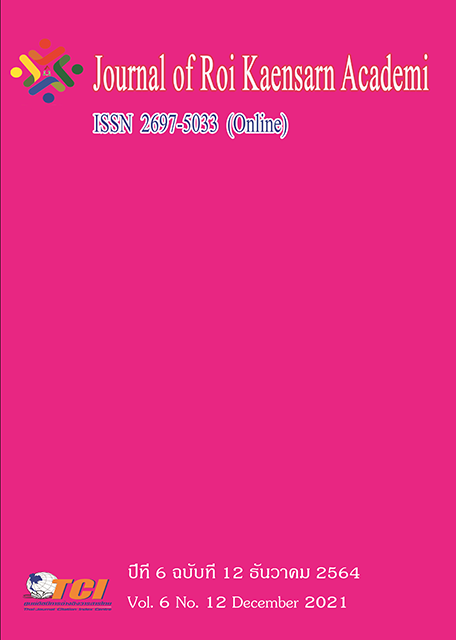Improving English Pronunciation of Bhutanese Esl Learners Using Creative Drama
Main Article Content
บทคัดย่อ
The aims of the study were (1) to compare the learners’ English pronunciation ability before and after learning with creative drama, and (2) to explore the learners’ opinion towards the implementation of creative drama instruction. Twenty-five Bhutanese ESL learners selected through cluster sampling, with a 12-week studying pronunciation using creative drama instruction. The English pronunciation ability test and interview were used to obtain qualitative and quantitative data. The quantitative analyzed data included the mean scores, standard deviation, and Wilcoxon signed ranks test, and the qualitative data from the interview were analyzed using content analysis.
The results revealed that pronunciation ability was higher after studying with creative drama at the .05 level of significance (z=- 4.396b, p=.000). In the interview findings, all participants asserted a positive opinion towards creative drama instruction in both the improvement of their English pronunciation abilities and learning activities.
Article Details
เอกสารอ้างอิง
Abu-Latiff, M. A. (2020). The effect of using drama- based instructional strategy on developing English language proficiency. Велес. 81 (3), 48–55.
Alsagoff, L. (2010). English in Singapore: culture, capital and identity in linguistic variation. World Englishes, 29 (3), 336–348.
Benjamin, R. A. (2012). Development and validation of the comprehensive oral reading fluency scale. Online. Retrieved July, 20 2021. from https://getd.libs.uga.edu/pdfs/ benjamin_rebekah_a_201208_phd.pdf
Bhutan Council for School Examinations and Assessment. (2013). A Study of Student Achievements in English Literacy and Mathematics Literacy at Grade X. BCSEA. Online. Retrieved July, 20 2021. from http://www.bcsea.bt/publications/NEA2013-2014.pdf
Bsharat, T. R. K., & Behak, F. (2021). The insights of using creative drama in learning speaking skills for the 7th graders in jenin city: A case study. Ilkogretim Online – Elementary Education Online, 20 (5), 37–51.
Chesner, A. (2020). Creative Drama Groupwork for People with Learning Difficulties. (2nd Edition). Routledge.
Choeda, C., Gyeltshen, T., Daker, S., Gyeltshen, S., Wangmo, W., & Letho, D. (2020). Communicative Competence of Secondary School Students of Bhutan. Journal of Humanities and Education Development. 2 (1), 12–25.
Crystal, D. (2012). English as a Global Language - Second Edition. Klett Sprachen GmbH.
Dendup, T., & Onthanee, A. (2020). Effectiveness of cooperative learning on English communicative ability of 4th grade students in Bhutan. International Journal of Instruction, 13(1), 255–266.
Derakhshan, A., Khalili, A. N., & Beheshti, F. (2016). Developing EFL Learner’s Speaking Ability, Accuracy and Fluency. English Language and Literature Studies, 6 (2), 177.
Gilakjani, A., Ahmadi, S., & Ahmadi, M. (2011). Why is Pronunciation So Difficult to Learn? English Language Teaching, 4 (3).
Gilbert, J. B. (2018). Issues in Teaching Pronunciation: Prosody, Intonation, and Vowels. The TESOL Encyclopedia of English Language Teaching, 1–9.
Güryay, B. (2019). A study on prospective English teachers’ self-perception of using creative drama in English language teaching. In V. Chiou, O. Holz, O. N. Ertürk, & F. Shelton (Eds.), International Insights: Equality in Education (1st ed., pp. 127–134). Waxman.
Jenkins, J. (2017). ELF and WE: Competing or complementing paradigms? In World Englishes (1st Edition, pp. 52–68). Routledge.
Korkut, P., & ÇElik, Z. (2018). Developing pronunciation through creative drama. The Language Learning Journal, 49 (2), 147–159.
Mariani, M., Ruslin, R., & Afifah, A. (2020). Improving Students’ Speaking Skill Through Role Play: An Action Research for The Eight Grade Students of Smp Negeri 1 Pedongga. Datokarama English Education Journal, 1 (1), 39–52.
Momeni, S., Khaki, M., & Amini, R. (2017). The Role of Creative Drama in Improving the Creativity of 4–6 Years Old Children. Journal of History Culture and Art Research, 6(1), 617. https://doi.org/10.7596/taksad.v6i1.765
Munro, M. J., & Derwing, T. M. (2011). The foundations of accent and intelligibility in pronunciation research. Language Teaching, 44 (3), 316–327.
Narimanovna, G. Z. (2019). Peculiarities of using drama in teaching foreign languages. Велес, 45 (6), 92–93.
Oguz Namdar, A., & Kaya, Ö. S. (2019). Teachers’ Self-Efficacy perceptions and attitudes towards using creative Drama. Hacettepe Universitesi Egitim Fakultesi Dergisi-Hacettepe University Journal of Education, 34 (4), 901–914.
ÖZek, M. B. (2016). The Effect of Creative Drama on Student Achievement in The Course of Information Technologies. Journal of Education and Training Studies, 4 (6).
Ramiza, D., & Albion, P. (2013). English language in Malaysian Education System: Its existence and implication. (3rd). Malaysian Postgraduate Conference, Sydney, Australia.
Singay. (2018). English Oral Communication Needs of Bhutanese Students: As Perceived by the Teachers and Students. English Language Teaching, 11 (4), 74.
Thornbury, S. (2000). Accuracy, fluency and complexity. Readings in Methodology, 16, 139–143.
Tsybaneva, V., Seredintseva, A., & Maletina, O. (2019). Using drama in teaching intonation. Online. Retrieved July, 20 2021. from https://doi.org/10.2991/ismge-19.2019.128
Ulas, A. H. (2008). Effects of Creative, Educational Drama Activities on Developing Oral Skills in Primary School Children. American Journal of Applied Sciences, 5 (7), 876–880.
Ulubey, Z. (2018). The effect of Creative Drama as a method on skills: A meta-analysis study. Journal of Education and Training Studies, 6 (4), 63–78.
Wyse, D., Jones, R., Bradford, H., & Wolpert, M. A. (2018). Teaching English, Language and Literacy. (4th ed.). Routledge.

